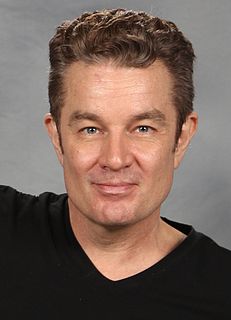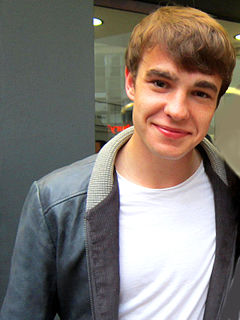A Quote by Gary Cole
Improv is not something I had a lot of experience with, because for a long time, my only experience in front of a camera was all television, which is pretty rigid script-wise, except for the occasional scene where you toss in an ad-lib just to elongate something.
Related Quotes
Improv is not something I had a lot of experience with, because for a long time, my only experience in front of a camera was all television, which is pretty rigid script-wise, except for the occasional scene where you toss in an ad-lib just to elongate something. Like, say, you're walking down a hall and you just don't have enough dialogue, and you throw in something. But you don't really have time to do other than what's written. It's very rigid. Shows have a certain rhythm that nobody wants disturbed.
Generally, there's a lot of ad-lib involved with live TV and things like that, whereas with acting in front of the camera, it was, if you screwed up a line, well, you've got another take, and you also had a script to be able to study, so it wasn't all ad-lib and flying by the seat of your pants, which I like both aspects, actually.
I'm not an ad-libber. If I'm asked to ad-lib, I can ad-lib forever and it's really fun to do that, but I find that well-written scripts are put together very carefully. Once you start to ad-lib and add words to sentences, there's a slacking that happens. When it's good writing, it's taut. I'm not judging people who do ad-lib.
I think with improv - and I say it all the time because it's become such a catch thing that you talk about improv - if the scene is well-written, you don't need to improv. But that being said, if something strikes you in the moment and, most importantly, you know where the scene is supposed to go, it's no different than method acting.
Because of the way that I work with the actors and because a scene is not in this rigid and literal interpretation of something written, I can constantly change stuff, which means I can get a scene absolutely perfect, and then when we go to shoot it, the requirements of the shot mean it would be useful to extend the dialogue or take a line out or swap things around. So the camera doesn't serve the action. The action serves the camera. That's important. So it becomes more and more organic and integrated.
I have never seen a script that hasn't gone through at least eight different iterations before they even begin filming, and frequently what is filmed is not what's in the script, because things change on the ground. An actor can't say a particular line. An actor will have a brainstorm and ad lib something utterly brilliant.
I love performing. I love doing improv. It's a totally terrifying experience, but it's something that I've always felt so strongly about and that I'm kind of obsessed with. And just as an actor, it's a great exercise. It's a great playground, you know, to try things out and to work on your skills. Because the mandate of improv is kind of the same as acting: It's all about your scene partner, it's all about being present and in the moment and exploring together as a team, a collaboration.
I remember like that scene with Pharrell where they're at the music video shoot, we have this on camera actually, Pharrell's confused because we weren't doing the script. We were doing all this improv and then Diddy says to him... Pharrell's like I don't understand what's going on and Diddy goes, "We do a lot of improv". (laughter) I remember being we just made him into a comedy nerd. We somehow turned Sean Combs into a comedy nerd, so.
A novel which survives, which withstands and outlives time, does do something more than merely survive. It does not stand still. It accumulates round itself the understanding of all these persons who bring to it something of their own. It acquires associations, it becomes a form of experience in itself, so that two people who meet can often make friends, find an approach to each other, because of this one great common experience they have had.



































